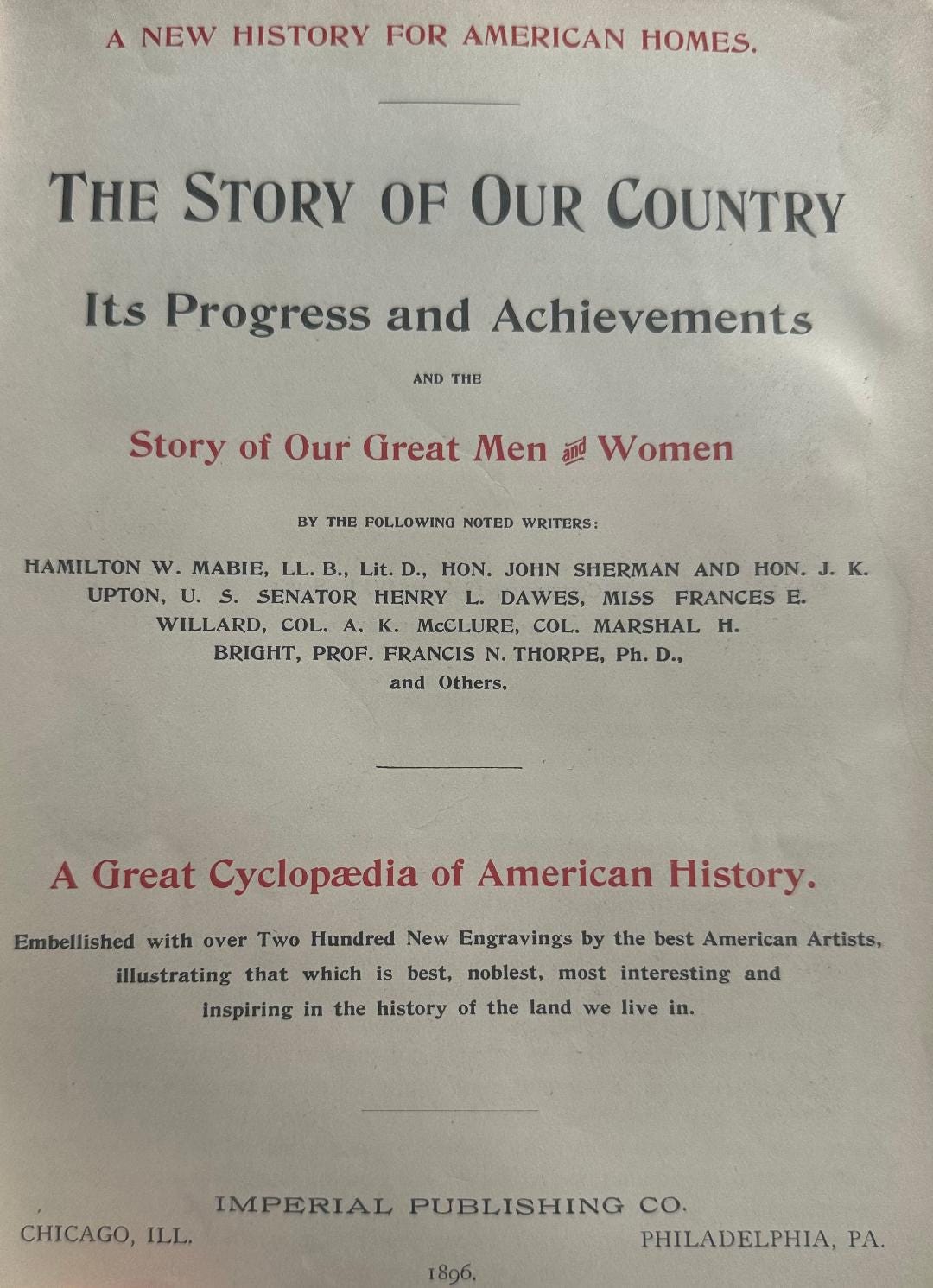Some History and a Challenging Question
A Used Book from 1896 Yields a Fascinating Find
I recently purchased a first edition of the book, Story of our Country: Its Progress and Achievements (1896), published by the Imperial Publishing Company, with offices in Chicago, Illinois and Philadelphia, Pennsylvania. It was touted as “A New History For American Homes.”
Two of the contributors to the book were U.S. Senator Henry L. Dawes from Massachusetts, and his wife Anna L. Dawes. She wrote Chapter XIII of the book, titled “The Story of the Indian.” An excerpt of Ms. Dawes’s chapter (with edits based on my Domination Translator added), reads:
“At the time when our forefathers first landed on these shores, they found the Indian here [living free and independent]. Whether at Plymouth or Jamestown, at the mouth of the Hudson [River] or in Florida, their first welcome was from the red man. . . [T]he white settler coveted the land and pushed the Indian off it that he might dwell there in peace. And it must be said that in the seventeenth century [the 1600s] he [the Christian European] violated no tradition, set himself against no law, human or divine, when he did this [pushed the Indian off the land by establishing domination over it].
“Possession [domination] was still the right of the stronger, the world over, and the conquest [domination] of new countries the chief glory of king and commons alike. To flee away from oppression [domination] was the only refuge, and to the oppressor [dominator] as well as oppressed [dominated] it seemed a natural resort. The country was broad enough for both, thought the white man. If the red man could not live with the new comers on the coast, let him fly to the fresh wilderness of the interior; and so he did, year after year, until one day there was no more wilderness [where the Native peoples could live free].”
Anna Dawes’s explanation acknowledges that the Original Nations and Peoples of the continent had been living perfectly free for countless generations when the Christian Europeans arrived and “coveted the land,” meaning “to desire what belonged to someone else.” She goes on to describe a centuries-long process whereby, for generations, the free Nations and Peoples were forced by foreign and invading colonizers and their descendants to live under the invading People’s claim of a right of domination, which she calls “oppression.”
As question arises: Will it be possible for the Original Nations and Peoples which have been living under the invading claim of a right of domination for so long, to one day free themselves from that claim?
In the U.S. Supreme Court ruling Cherokee Nation v. Georgia (1831), Chief Justice John Marshall wrote: “They [the Cherokee] occupy a territory to which we assert a title independent of their will.”
By writing in this manner, Marshall was providing evidence that he and other intellectuals representing the United States were conscious of the fact that they were mentally creating the idea of a “U.S. title” to Cherokee lands and doing so against the will of the Cherokee people.
By using the phrase “independent of their will,” Marshall was indicating that he and his fellow intellectuals working for the United States knew the Cherokee people could do nothing to stop them from engaging in that dominating mental activity. There was also nothing the Cherokee could do to stop the representatives of the United States from physically acting upon their mental activity of domination.
The above example provides us with a deep insight: When one People mentally creates and asserts a right domination over another People, against their will, it stands to reason that the only way the dominated People will end up free from that imposed claim of a right of domination, is if the People mentally creating that claim, and acting upon it, stops making that claim.
Until that happens, however, it makes sense for the Peoples being dominated to never stop organizing and advocating on their own behalf, by demanding that the dominating People end their claim of a right of domination over and against them.



Good work. A treasure for analysis in that old book, written before the dominators were embarrassed (though they were bare-assed) about their claim of a right of domination.
Sharing your post and seeking to extend it: https://open.substack.com/pub/steven3c6/p/an-extension-of-a-steve-newcomb-essay?r=21x2h&utm_campaign=post&utm_medium=web&showWelcomeOnShare=true